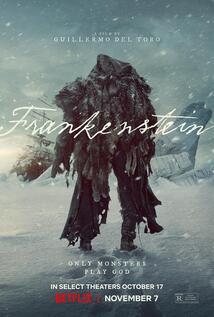

Mary Shelley's Frankenstein gets yet another screen treatment, even though there has been nothing new to say with this iconic tale of life, death, creation, ambition, and madness over the last four decades. I had to go back past the previous seven screen adaptations I've seen (there are a lot more) to Quadrophenia director Franc Roddam's The Bride (1985) with Sting, Jennifer Beals, Clancy Brown, and David Rappaport, to find a film with a fresh and original take on the story—and The Bride isn't even a good movie! But it's better than this overproduced, underwritten, over-acted, underwhelming epic telling of the tale from monster-obsessive Guillermo del Toro. It should come as no surprise that the only interesting character in del Toro's version of the ultimate monster story is the monster.
Jacob Elordi (Priscilla, Saltburn, The Sweet East) creates a sympathetic soul in this version of The Creature, even though he looks like a cross between Doug Jones in del Toro's The Shape of Water and Robin Williams in Bicentennial Man, by way of the humanoid alien at the beginning of Prometheus. Elordi is also saddled with some of the worst dialogue this side of Mickey 17. The rest of the cast—Oscar Isaac as Baron Victor Frankenstein; Mia Goth as Victor's soon-to-be-sister-in-law, whom he’s in love with, Lady Elizabeth Harlander; Christoph Waltz as Elizabeth's uncle and Victor's wealthy benefactor, Henrich Harlander; and Charles Dance as Baron Leopold Frankenstein, Victor's biopic-ready father who ruled over his son in oppressive, life-scaring ways, crew the screnery like made, which is all one can do when given characters as paper thin as these.
With an invented flashback that enables the 150-minute feature to be broken into two main parts, the first distinctly less interesting than the second, Isaac and then Elordi explain the story to us (and to Lars Mikkelsen, the captain of a ship trapped in the Arctic ice) in voice-over. Despite the expanded running time, the story feels absurdly truncated to the point where key scenes in the narrative unfold so quickly you can't believe how little screen time they got. Absolutely nothing any of the characters do or say makes much sense, except for the syphilitic Henrich Harlander, whose motivations are clear as day. But the Barron's actions are bewildering—sure, he's mad, but he should at least have some internal logic of his own that we can track from scene to scene, and Elizabeth's psychology, philosophy, and predilections are so nascent she comes off like a rough sketch rather than a dynamic and engaging individual.
Every action each character takes feels motivated only by the need to move the story from one beat to the next. Del Toro, a screenwriter who almost always values spectacle over storytelling, seems to assume we all know this story already, so we don't need to understand why the people in it do what they do. The "climax," in which the severely wounded Barron hunts his creature for ages, even though he knows the creature is indestructible, can only make sense if viewed strictly as a way to get us back to where the movie started, on the icy sheets of the Arctic. By the time we get to the picture's saccharine conclusion, we've watched these two go through so much that their final moment together is laughably ridiculous.
This is a bad movie, but it looks good. At least the production design looks good. The CGI effects, not so much. The film is filled with the kind of physics-defying action and violence that has looked terrible for more than 20 years now (has no one been able to improve on this problem in two decades?), as well as ineptly rendered animals (the credits reference puppeteers and animatronics designers, but they look like they were produced by overworked, underpaid CGI animators who just didn't give a damn). Maybe this movie suffered in my eyes, as it was the next film I saw after Springsteen: Deliver Me from Nowhere, but the abusive, stern, or absent father trope is so played out as a cinematic device, not to mention an excuse for male violence and egotism, that I'm constantly amazed that filmmakers still view it as an acceptable narrative device, especially in a story that takes place in the late-1800s. I mean, wasn't everyone's dad terrible then? This is bereft of the moral complexities and existential ponderings inherent in Mary Shelley's Modern Prometheus; it's so reductive it should be called Guillermo del Toro's Franken-Shine.
It should come as no surprise that the only interesting character in monster-obsessive Guillermo del Toro's take on the ultimate monster story is the monster in this overproduced, underwritten, over-acted, underwhelming epic telling of the tale.




